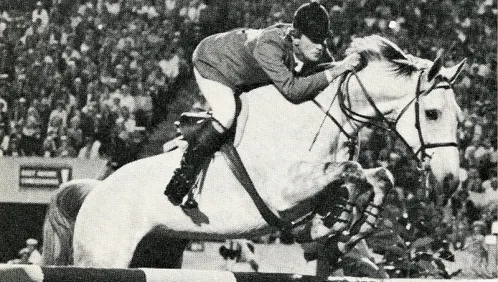Recently I have been reflecting on the experience of selling a horse, or, as is more often the case with me, trying to sell a horse.
I have read that intermittent reinforcement is a very powerful motivator. For example, the gambler who only wins occasionally is still likely to want to gamble more and more often. Horse sales are like that for me. I have only made money every third or fourth transaction, but it fuels my optimism. With good feed and some conditioning, I think, surely the next one will turn out to have some great, undiscovered talent. Talent that is marketable, I mean, not like the talent my last horse had for setting other horses loose.
It is liberating to be so bad at something that you become willing to try any new approach. I have thought a lot about new strategies, and I’ll share them here. They are untested, but I feel 100 percent confident they will work.
The first thing you need to do is determine what kind of buyer you have. This should not be difficult. As horse people we are all mentally impaired, but we only come in about a half dozen kinds of crazy. You can recognize the types by some characteristic kinds of remarks they make. Then you can respond accordingly.
The Rescuer lives to protect all equines, one horse at a time. She’ll probably talk you down after the sale, but she’ll buy your horse just to save it from awful situation in which he currently resides (read, no stall mats).
Typical remark: “The seven horses I own were all abused, except for Starry. The PMU mare had her after the Mustang jumped the fence.”
Strategic Response: “Once I changed my horses’ hay from timothy-alfalfa mix to straight timothy in just one day.”
The Optimist is experienced and knowledgeable, but for some reason expects to buy a young, sound, made horse for under $5,000.
Typical remark: “When I was riding with (top rider name here), I won a lot of money in the jumpers even though I had a rustic place like yours” (meaning, no indoor wash rack).
Strategic Response: “This horse has a lot of talent, but I’m just not a good enough rider to finish him.”
ADVERTISEMENT
The Cuddler means well but treats her horses as if they are 1,200-pound lap dogs. Often, she started riding later in life and is unconsciously trying to broker a deal with her horse: If I just feed you enough treats, will you please behave? The horse is only too happy to see her as a walking carrot-dispenser but may get a little hazy about his end of the bargain once she’s in the saddle.
Typical Remark: “I baked a special birthday cake for my horse, and the next day we had the best trail ride, he didn’t even try to scrape me off under a tree branch!”
Strategic Response: “This horse stood absolutely still when we had Santa and the photographer out to make the Christmas pictures.”
The Trainer who has a vaguely European-with-a-hint-of-Brooklyn accent will be very positive about your horse, although you don’t want to know how much he marks the horse up to his client.
Typical Remark: “You vill ride him for me, no? Yes, yes, very nice. I vas teaching clinic in England, and dis horse, he is like a horse I see there, I think he vas Friesian-Selle Francais with some Velsh pony–you know dis cross?”
Strategic Response: “This horse would do fine for your amateur client, as long as you keep him taking lessons four times a week.”
The Masochist is constantly seeking a challenge and will reject your horse if he seems too ordinary and well-behaved.
Typical Remark: “No one else can ride the horse I have now, but I had a lot of time to think when I was in traction, and I worked out a system. Now we get along perfectly. He’s really not so bad after the second hour of longeing.”
Strategic Response: “This horse seems normal, but once in a blue moon he’ll just start bucking and rearing. It’s too bad, because several people were interested in him, but they got scared off.”
ADVERTISEMENT
The Decorator is really more interested in pasture art than actual riding but has a hard time admitting this. If you can give her an out she’ll probably buy your horse.
Typical Remark: “I have a horse now but his mother got arthritis in her hocks at age 15, and he’s 12 already, so just to be safe I’m not riding him anymore.”
Strategic Response: “Well, I probably shouldn’t say this because I’m trying to sell this horse, and he’s going perfectly sound now, but once a vet said he looked like the type of horse that could develop ringbone.”
One would think you are home free after you have survived the trial rides and the vetting process, but sometimes that is just when things get interesting. Consider my friend’s experience with a commercial horse hauler. She shipped a 17.1-hand, black warmblood gelding to a buyer in Long Island, or so she thought. What actually got delivered was a 15-hand, chestnut mare. Her horse ended up two hours away from the buyer, running up a board bill at a barn to which she had no connection at all.
Horse sales are nothing if not an adventure, whichever side of the transaction you are on. What we really need is some kind of blue book valuation system for horses. Quite apart from pedigree or performance record, this could help one calculate a fair price for qualities that can make owning a given horse a joy or a nightmare.
For example: Loads himself on trailer–add $500. Makes manure in one corner of stall–add $1,000. Lets you clean sheath without sedation–add $200. Does not get excited by nippy Border Collies, grunting pot-bellied pigs, or shrieking peacocks–add $400.
On the other hand, there would be a scale for negatives. For example: Chews lead ropes and reins–minus $500. Colics when the barometric pressure drops–minus $2,000. Colics when the husband is the only one home–minus $5,000 (in some cases, this will mean the seller will actually owe you money for carting the horse away).
In any case, I think it must be the glamour that keeps us seeking that next winner in the horse world. At least, that is what I tell myself when I am digging post holes, stacking hay, or hosing down a horse that spooked in the pasture and logged a few miles at a gallop on a day when the heat index was 107 degrees. I’m not sure how much more glamour I can take!













